Jake, Reinvented by Gordon Korman
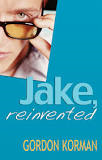 Summary: Jake Garrett is a mysterious new student at F. Scott Fitzgerald High School. He’s the new star of the football team, he throws wild parties every week, and he’s in love with the quarterback’s girlfriend, Didi. Everyone knows of him, but no one really knows Jake himself, except for Rick, a fellow football player at school. Rick acts as narrator, confessor, and witness to Jake’s true intentions, learning just how far Jake will go for love. As tension between characters mounts, Jake’s commitment will be put to the test with devastating results.
Summary: Jake Garrett is a mysterious new student at F. Scott Fitzgerald High School. He’s the new star of the football team, he throws wild parties every week, and he’s in love with the quarterback’s girlfriend, Didi. Everyone knows of him, but no one really knows Jake himself, except for Rick, a fellow football player at school. Rick acts as narrator, confessor, and witness to Jake’s true intentions, learning just how far Jake will go for love. As tension between characters mounts, Jake’s commitment will be put to the test with devastating results.
Number of Pages: 213
Age Range: 15-17
Review: Jake, Reinvented by Gordon Korman is the modern day re-telling of F. Scott Fitzgerald’s The Great Gatsby. I have to admit, I almost didn’t catch it because I haven’t read The Great Gatsby since high school, and then under great protest, but Korman includes a quote from it at the beginning of his book, and names the high school after F. Scott Fitzgerald. Also, once I did look up The Great Gatsby to refresh my memory, I realised Korman uses the same initials for his characters as Fitzgerald does (except for Rick instead of Nick), and while he changes the story in some respects, it’s pretty close to the original, just modernized.
Reading Korman’s work gave me a greater understanding of Fitzgerald’s work, and I liked it better. I found Fitzgerald’s work hard to relate to, but with Korman I finally understood exactly what was going on. Rick’s narration provides a outside perspective similar to Dunstan Ramsay in The Fifth Business by Robertson Davies, and I liked reading about a character who is involved in the story but is also able to be an observer as well. Rick obviously cares about Jake and tries to save him from himself, unfortunately to no avail. Jake is misguided but still sympathetic, which is something I never ended up feeling for Gatsby. Gatsby came off as aloof even though he was desperately in love with Daisy, but Jake is obsessed with Didi and it is easier to see how it takes over his focus and his life. I think Gatsby’s and Jake’s feelings for the women they love are more believable and suitable in a teen setting than they were in The Great Gatsby. I liked too how Rick got a happier ending in Korman’s version.
It’d be so interesting to have a high school English class read both books and then decide which they liked better. Also, there would be so much to write about for an assignment, comparing and contrasting the two stories. Kind of makes me want to re-read The Great Gatsby myself just so I can pick both books apart and dig into what Korman was trying to accomplish. It’s a great read if you’re a Fitzgerald lover, but also if you’re not.
Memorable Quotes:
“The roar sputtered and died just in time for us to hear the guy’s ‘explanation’ of what had happened:
‘There’s no place to park out there!’
Oh, that was reasonable. If you can’t find a spot, your only alternative is to drive your motorcycle up the front walk, through a closed door, and into a roomful of innocent bystanders.
I waited for the crowd to fall on the driver and beat his stupid head in. Instead, they acted like it all made sense to them. A bunch of kids hauled him to his feet, dusted him off, and escorted him to join the chaos.” – Rick from Jake, Reinvented by Gordon Korman, pages 155-156
“After what happened to that poor guy two years before, it was easy to see how Didi was more than a girlfriend to him.
She was the ultimate affirmation, a megaphone blaring: I’m as good as you! Don’t I have the girl of everybody’s fantasies right her in my arms? It must have been enough to erase years of teasing that had surely been directed at an exceptionally bright kid.” – Rick from Jake, Reinvented by Gordon Korman, page 164
“It occurred to me that he would never see the reality of what was being done to him. Because then he’d have to admit to himself that he’d been nothing more than an unimportant footnote in Didi’s book. And that would mean accepting the fact that the last two years of his life had been totally meaningless.
How could you save a guy who wouldn’t let himself be saved?” – Rick from Jake, Reinvented by Gordon Korman, page 188
“Out of all of them, only Dipsy had cared enough to show up – Dipsy, who they teased and tormented. Maybe there was something about being picked on that was character building, that made you a human being.” – Rick from Jake, Reinvented by Gordon Korman, page 202
Jake, Reinvented by Gordon Korman is published by Scholastic Canada (2003).
(Buy this book: Amazon | Indigo
| Canadian Booksellers)
Yellow Mini by Lori Weber
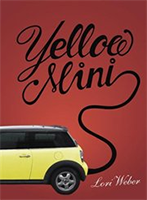 Summary: A collection of free verse poems that make up stories about growing up told from various perspectives. Storylines include Mark and his grieving process over his father dying, Stacey and her need for attention, Annabelle focusing on changing the world, Christopher falling in love and getting his first girlfriend and Mary stepping out of her shell to play in the school’s talent show. These stories intertwine with each other, and insights are provided by everyone involved.
Summary: A collection of free verse poems that make up stories about growing up told from various perspectives. Storylines include Mark and his grieving process over his father dying, Stacey and her need for attention, Annabelle focusing on changing the world, Christopher falling in love and getting his first girlfriend and Mary stepping out of her shell to play in the school’s talent show. These stories intertwine with each other, and insights are provided by everyone involved.
Number of Pages: 240
Age Range: 13-15
Review: Yellow Mini by Lori Weber is a free-verse novel that contains interconnected vignettes told from a variety of perspectives.
I like how the threads of the story weave together, mostly because Weber chooses interesting perspectives to draw from: students, parents, and teachers. As a result the book is incredibly well-rounded, and I enjoyed getting multiple views of the same situation.
My favourite story was Mark’s. His grief over his father’s death was poignant and I thought his journey to find the land his father intended to buy was a creative way to deal with it and memorialize his father. I was pleasantly surprised when he found an unexpected friend in Mary, especially when it was clear that Stacey didn’t really understand what he was going through.
But what touched me most were the perspectives from the parents. Honest and raw at times, they showed that adults don’t have it all figured out either, and that the process of growing up is difficult on both sides.
It was a quicker, lighter read about the challenges of growing up that I would recommend to early to mid teen readers.
Memorable Quotes:
“We kissed on the big rock, way out
in the middle of the lake, our tongues
sparking like flint. With each spark,
a piece of my childhood chipped
and fell into the lake, taking away
the geeky girl I had been. – from Crossed Over by Stacy from Yellow Mini by Lori Weber, pages 6-7
“When John Lennon said, Whatever gets you through the night
he meant night as a metaphor for any hard place, like school
I know that. These kids know it. Why not get through
AND change the world in the process?” – from These Kids by Mr. Dawe from Yellow Mini by Lori Weber, page 31
“I watched, I couldn’t help thinking how
hugging used to come to us so naturally; we
did it with both girls, and each other, all the time,
yet just now it was like he had to relearn the gesture,
like someone in rehab, learning to walk after an accident.” – from Simplicity by Stacey’s Mom from Yellow Mini by Lori Weber, page 232
Yellow Mini by Lori Weber is published by Fitzhenry & Whiteside (2011).
(Buy this book: Amazon | Indigo
| Canadian Booksellers)
What World is Left by Monique Polak
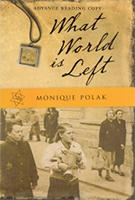 Summary: Anneke and her family are forced to live in Theresienstadt concentration camp during World War II because they are Jewish. Only 14 when she enters the camp, Anneke quickly loses her innocent and childlike nature in favour of survival at any cost. But although death touches those around them, causing Anneke to lose friends and a romantic interest, Anneke’s family makes out of Theresienstadt alive. Now 16, Anneke is forever changed, and must find a way to come to terms with everything her family had to do to survive.
Summary: Anneke and her family are forced to live in Theresienstadt concentration camp during World War II because they are Jewish. Only 14 when she enters the camp, Anneke quickly loses her innocent and childlike nature in favour of survival at any cost. But although death touches those around them, causing Anneke to lose friends and a romantic interest, Anneke’s family makes out of Theresienstadt alive. Now 16, Anneke is forever changed, and must find a way to come to terms with everything her family had to do to survive.
Number of Pages: 215
Age Range: 14-16
Review: Survival, for those who’ve been faced with it, often comes with a price tag. What World is Left by Monique Polak is an incisive, well-written look at the emotional cost of physical survival, based on Polak’s mother’s experiences living in Theresienstadt concentration camp during World War II.
Anneke is a strong, thoughtful character just trying to deal with her new life. Scrubbing cauldrons used to cook soup for the camp, keeping a low profile to avoid attracting Nazi soldiers attention, and being selective in who she befriends because the chance of losing them is so great, Anneke grows up quickly under harsh conditions.
She has trouble understanding when her artistic father participates in something called the Embellishment, a dressing up of the camp to convince Danish investigators the camp has no lethal intentions towards its inhabitants. When the Embellishment is successful the Germans decide to make a propaganda video called “The Fuhrer Gives a City to the Jews,” enlisting Anneke’s father’s help once again.
Anneke is caught between knowing the truth of life in the camp and hating her father for the farce he is helping to perpetrate, until she finds out he is secretly using his talents as an artist to make a visual record of the camp’s reality at great risk to himself and their family.
Polak captures Anneke’s inner turmoil vividly, and I love how she brings Anneke around to realise how much her father did to keep them all alive. At the end of the novel, Anneke is severely beaten down in spirit, but not destroyed. She knows she will be able to find a way to live her life, even though she will be forever marked by what has happened. Anneke’s existential exploration of the great questions of life is continually thought-provoking and memorable.
I would recommend What World is Left to teens studying the Holocaust, because even with all the reading I’ve done about it, I had still never heard about the Embellishment at Theresienstadt. But it is also for those looking for a well-written, deep read about what it means to go through something unspeakably horrific and survive.
Memorable Quotes:
“The way my mind works almost makes me laugh. ‘That Anneke is always inventing stories in her head,’ Opa, who is my father’s father, used to say about me when he knew I was listening. He was teasing, but I know that in some way, he had paid me a compliment. I cannot paint like Father, but I can invent stories. And certainly that is something.” – Anneke from What World is Left by Monique Polak, page 10
“If only I could cry. I’d cry for those three dead men, and also for myself and for Hannelore who watched them die.
But my throat hurts too much. It’s as if the tears I cannot cry have settled at the bottom of my throat and are making it throb.” – Anneke from What World is Left by Monique Polak, page 51
“All this is one more bitter truth about life in Theresienstadt: One person’s agony often means someone else’s gain. And though I am sorry to see others suffer, another part of me – a bigger part – is relieved it isn’t me. I know it’s awful, but that’s how it is.” – Anneke from What World is Left by Monique Polak, pages 73-74
“Franticek must feel the change in me, because when he speaks again, his voice is calm. ‘You have to understand,’ he says, ‘I’m not proud of it, but a person… well, a person has to survive. And in a place like this,’ he lifts his eyes toward the tall gray ramparts that surround us, blocking our view of the outside world, ‘sometimes a person has to take what he can get. Just to feel alive.'” – Franticek from What World is Left by Monique Polak, page 79
“Franticek is right. People need to take what they can. People need to feel alive. This kiss is what I need to take to feel alive. When it finally ends, and Franticek brushes one finger against my lips, I can feel tears pricking at the corners of my eyes. Franticek wipes them away.” – Anneke from What World is Left by Monique Polak, page 81
“The praying hurts my knees because of the wood floors in our apartment, but at least it makes me feel like I am doing something. I hope God, if He really exists, won’t be upset with me for only turning to him now, when things are so bleak. But I have a feeling He will understand my predicament.” – Anneke from What World is Left by Monique Polak, page 84
“We have to be strong for each other. We tell each other sometimes that it takes strength not to cry. But part of me isn’t so sure. could the opposite also be true? Might it take strength to cry, to consider all that was and will never be?” – Anneke from What World is Left by Monique Polak, page 116
“I am too frightened and too horrified to move. The drawings these soldiers are looking for tell the truth about Thereisnstadt. That’s why the soldiers are so angry! They’re afraid that somehow, one day, people will see the drawings – and know the truth. But if the drawings are destroyed, no one will ever know the truth. There will be no point to all our suffering! It will be as if none of this ever happened. The thought makes me reach for my throat. People have to know! Otherwise, things like this – murders, lies, soldiers terrifying girls – will happen again. It’s so unfair. I feel like falling to my knees and weeping. I feel like giving up. If no one ever learns the truth about Theresienstadt, what difference will it make if I do give up?” – Anneke from What World is Left by Monique Polak, page 163
“Even if the end of the war really is coming close, I begin to feel as if I want to give up. I’ve heard Mother and Father whisper about prisoners who have committed suicide in Theresienstadt: people who’ve hanged themselves, and a man who slit his wrist with glass from a broken windowpane. Before I came to Theresienstadt, I never understood why someone would take his own life. But I understand now: They simply wanted to put an end to the pain. Unbidden, a line from Heinrich Heine’s poetry pops into my head: ‘My heart, my heart is heavy.’ Heine understood how I feel now. My heart is so heavy I can barely stay standing.” – Anneke from What World is Left by Monique Polak, page 191
“I lost so much in Theresienstadt: my innocence, my belief that all people were basically good. But now I have the heady sense that I have nothing left to lose. I don’t need to be afraid ever again – of anybody.
I’ve witnessed terrible things I’ll never forget, but I survived. Surely this means I can survive anything.” – Anneke from What World is Left by Monique Polak, pages 212-213
“This part is harder for me than standing up to the Dutch officer. It’s not that I’ve stopped questioning what Father did to keep us alive. In fact I think no matter how old I get, some part of me will always question what Father did to keep himself and us alive in Theresienstadt.
But something important has changed. Now I understand that Father really had no choice. And I know that he must live with that burden. Just as I shall live with it until I take my last breath on Earth.” – Anneke from What World is Left by Monique Polak, page 214
“I take Father’s hand and together, we recite the rest of the poem: ‘ Think what world is left you still, And how lovely is that part.’
Father is right. And though Heine lived long before us, he knew it too. Even after all the senseless sorrow and suffering, there is still world left. I know I will never be able to forget all I saw and felt and lost in Theresienstadt, but there is still world left.
It will be up to me to find the loveliness.” – Anneke from What World is Left by Monique Polak, page 215
What World is Left by Monique Polak is published by Orca Books (2008).
(Buy this book: Amazon | Indigo
| Canadian Booksellers)
Undercurrent by Paul Blackwell
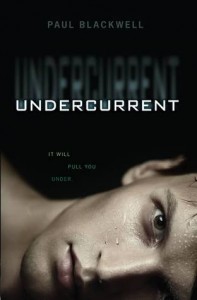 Summary: After surviving going over Crystal Falls, Callum finds the small town where he lives is not quite as he remembers it. Buildings and businesses are missing, his parents are still together, and his older brother Cole has been in a terrible accident leaving him ventilator dependent. But the most surprising thing of all is how others are treating him. Suddenly he’s a football star with such a badass reputation that no one will cross him. Except for a handful of people that want him dead. Somehow he has to figure out what is really going on, preferably before one of them succeeds.
Summary: After surviving going over Crystal Falls, Callum finds the small town where he lives is not quite as he remembers it. Buildings and businesses are missing, his parents are still together, and his older brother Cole has been in a terrible accident leaving him ventilator dependent. But the most surprising thing of all is how others are treating him. Suddenly he’s a football star with such a badass reputation that no one will cross him. Except for a handful of people that want him dead. Somehow he has to figure out what is really going on, preferably before one of them succeeds.
Number of Pages: 312
Age Range: 15-17
SPOILER ALERT!
Review: I was most intrigued by the possibility of Undercurrent by Paul Blackwell. In my life there are parallel universes that I have imagined, resulting from choices I have made or events that have happened in my life. But I never considered a parallel universe based on a choice I wasn’t even aware that I was making. Callum finds himself in just such a parallel universe, and his alternate self is taken aback when he realises the choice he wasn’t aware of was the decision that changed everything. It’s a powerful idea that lost a bit of strength in its execution.
Undercurrent is meant to be a psychological thriller of sorts, but when I started reading I was just confused. At first I thought perhaps Callum had swapped bodies with his brother Cole, then I realised Blackwell was trying to imply that perhaps Callum had injured his brain from his trip down the Falls, even though he did rule out that possibility pretty quickly. But it turned out he found his way into a parallel universe.
I love stories about parallel universes. Except Blackwell doesn’t reveal that it is a parallel universe until over 270 pages into the book. The book is only 312 pages, and even though there were hints along the way about the true nature of what was going on, Callum, the main character, doesn’t notice them or follow them up. I found myself to be extremely frustrated with his complete lack of initiative. Good thing he was able to convince alternate reality Willow to be his friend, otherwise I think it would have taken him even longer to figure things out.
By the time the ideas were flowing, it was the last forty pages of the story and things wrapped up very quickly. I was left wanting to know more because Blackwell had me hooked. It was a frustrating read because the emotional punch came right near the end and then it was just over!
Blackwell has potential, and I would read future books of his because I know that even though I had a love/hate relationship with Undercurrent, I am interested to see if he can harness it.
Memorable Quotes:
“I have yet to come you with anything better when the school comes into sight. Hearing the first bell, I realise I’m running late and have to jog the last block. My legs are feeling better, at least. The human body is an amazing machine, I have to admit, automatically repairing itself without any instructions or assistance. Unless it’s really broken, that is. Unless things are really hopeless.” – Callum from Undercurrent by Paul Blackwell, page 189
Undercurrent by Paul Blackwell is published by Doubleday Canada (2013).
(Buy this book: Amazon | Indigo
| Canadian Booksellers)
Tin Star by Cecil Castellucci
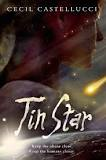 Summary: Tula Bane is headed for a new home among the stars when she and her family board the Children of Earth colony space ship with leader Brother Blue guiding the way. Troubles with the ship cause them to stop at Yertina Ferary space station where Tula is left for dead after she figures out Brother Blue is not all he appears to be. Abandoned on the alien station watching her ride slingshot around the local star without her, Tula finds herself without a clue of how to survive. Fortunately, aliens Tournour and Heckleck show her kindness and help her carve a new life for herself. Driven by plans to get revenge on Brother Blue at all costs, Tula finds her opportunity after three humans arrive unexpectedly at the station.
Summary: Tula Bane is headed for a new home among the stars when she and her family board the Children of Earth colony space ship with leader Brother Blue guiding the way. Troubles with the ship cause them to stop at Yertina Ferary space station where Tula is left for dead after she figures out Brother Blue is not all he appears to be. Abandoned on the alien station watching her ride slingshot around the local star without her, Tula finds herself without a clue of how to survive. Fortunately, aliens Tournour and Heckleck show her kindness and help her carve a new life for herself. Driven by plans to get revenge on Brother Blue at all costs, Tula finds her opportunity after three humans arrive unexpectedly at the station.
Number of Pages: 233
Age Range: 13-15
Review: Finishing Tin Star by Cecil Castellucci makes me want to read it all over again because I was so surprised by the ending that I feel like I need to give it a second read to see if there were clues that I missed.
I’m left with questions though. Is Castellucci setting up a sequel? Even though Brother Blue is clearly portrayed as the bad guy of the story, I’m not sure I understand what makes Tula so different from him. She starts out naïve and outspoken and it gets her into serious trouble, but by the end of the book she can con others like the best of them. The only difference seems to be that Brother Blue does it on a much larger scale.
I did like Tula and her grit in the face of losing everything she’d known, and her thoughts into what it actually means to be human were insightful. I also loved Castellucci’s exploration of what Earth would do if humans were able to achieve long-term space travel and colonization of other worlds. I’m an avid Star Trek fan, and never really thought about the possibility of Earth becoming an isolated planet on purpose. Anyone who leaves is branded a traitor and forbidden to return in Tin Star. Could we really develop the technology to live in space and then refuse to use it? It would be kind of like Jacques Cartier discovering Canada but then having no settlers move into the new world.
Okay, I suppose that’s not the best example considering Canada was already inhabited by Native Americans and the settlers did more harm than good in a lot of ways, but you get the idea.
I loved the idea of major and minor species depending on how many settlements they have across the galaxy and I wasn’t overwhelmed by the introduction of new species in the story although there were quite a few. I enjoyed the mentor relationship Hacklock had with Tula, taking her under his literal wing at a time when she was lost and alone. He was my favourite character.
All in all, I am hoping this is the start of a series because I want to know more about the universe Castellucci has created and what happens to Tula. I’d recommend this book for early to mid teen science fiction enthusiasts.
Memorable Quotes:
“If they were staying on the station, I still wasn’t ready to talk to them. I wasn’t sure that I wanted to associate with them. They were rude and loud and made me embarrassed to be a Human. No. It was more than that. They made me feel as though I were skinless, and that hurt.
It’s all right, I thought. Just because we’re the same species didn’t mean we had to be friends.” – Tula from Tin Star by Cecil Castellucci, page 84
“A few hours of sobbing passed, and then there was silence. I wonder if Els had gotten bored with getting no response or if the boys had managed to calm her or if it was something else. Adaptability. Even I had grown accustomed to my lot in life once it had changed. That was a gift. It was what made the Human species strong. It was what had made me strong.” – Tula from Tin Star by Cecil Castellucci, pages 137-138
“I had gone hungry at times during my time here, but truly I had been ravenous for touch. I knew that I would not be able to survive without it anymore. It was nourishing, intoxicating, and addictive. I would have to go with him. Or at least to where Human touch would be possible, and that left me only a few options.” – Tula from Tin Star by Cecil Castellucci, page 176
Tin Star by Cecil Castellucci is published by Roaring Brook Press (2014).
(Buy this book: Amazon | Indigo
| Canadian Booksellers)




 Amy Mathers has been passionate about reading from a very young age, and hopes others will share her enthusiasm for funding a teen book award.
Amy Mathers has been passionate about reading from a very young age, and hopes others will share her enthusiasm for funding a teen book award. 





